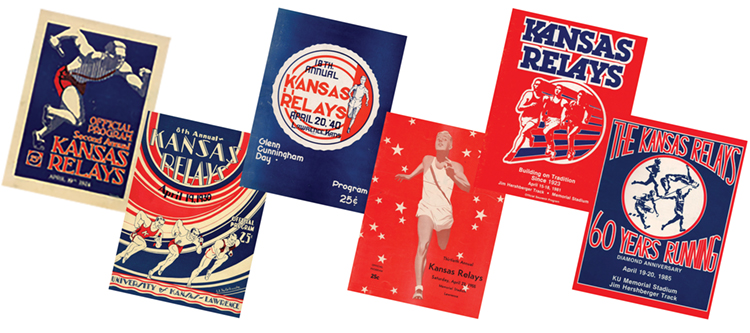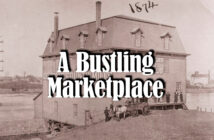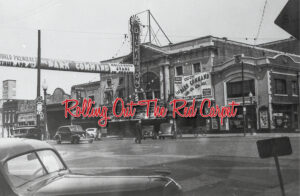Many of the greatest track and field Olympians got their start right here at the University of Kansas.
| 2017 Q3 | story by Patricia A. Michaelis, Ph.D., Historical Research & Archival Consulting

Kansas Relays Posters – Over the Years
What do a legendary basketball coach and a former KU football coach have to do with a track and field contest that became the premier spring sporting event in Kansas? They—Forrest C. “Phog” Allen and Dr. John Outland—collaborated to create the Kansas Relays. John Outland was born in Hesper, Kansas, and attended Penn College, in Oskaloosa, Iowa, and The University of Kansas (KU) in 1895 and 1896, where he played football and baseball. However, he went to the University of Pennsylvania to complete his medical training, where he was introduced to the Penn Relays. In 1920, he approached Dr. Allen, athletics director as well as basketball coach at KU, with the idea of starting a track and field meet at Kansas similar to the Pennsylvania version. As a result, Outland, Allen and KU track coach Karl Schlademan organized the first Kansas Relays in 1923, following the completion of Memorial Stadium with its quarter-mile track. From the beginning, the Relays attracted athletes who either were or would become Olympians.
More than 600 athletes participated in the first Kansas Relays. Tom Woodson Poor, from Bismarck, Missouri, competing for Kansas won the inaugural high jump. He participated in the 1924 Olympics in Paris, France, where he placed fourth in the high jump. Another early Olympian from Kansas was Jim Bausch, from Garden Plain, Kansas. A multisport athlete at KU, Bausch competed in the decathlon in the Olympics. At the 1932 games in Los Angeles, he set the world record for the decathlon at that time with 8,462 points.
Glenn Cunningham, from Elkhart, Kansas, was probably the best known of the early Kansas Relays Olympians. Baby boomers who grew up in Kansas read about the tragic accident experienced by 8-year-old Glenn and his brother Floyd in their textbooks. A fire at their school killed Floyd and severely burned Glenn to the point that doctors discussed amputating his legs and said he may never walk normally again. He and his parents refused to believe this, and after intensive therapy for two years, Glenn took his first steps since the accident in 1920. His racing specialty was the mile and the 1500-meter run. Only 12 years later, Glenn competed in the 1932 Olympics, where he placed fourth in the 1500-meter race. He was honored with a Glenn Cunningham Day at the 1934 Kansas Relays. At the 1936 Olympics, in Berlin, Germany, Cunningham won a silver medal in the 1500-meter run. With world-class athletes competing in the Relays, its first decade paved the way for the Kansas Relays to be a major event in track and field in the Midwest.
With the retirement of Glenn Cunningham and the advent of World War II, the event was cancelled from 1943 to 1945, and the Relays lost some of its prominence. However, Harrison Dillard, of Baldwin-Wallace College, in Ohio, set a world record in 1948 in the 120 high hurdles.
Bill Easton became KU track and field coach in 1948, helping KU build teams that dominated the Big 6 Athletic Conference and Midwestern track meets. One of the Olympians from this era was Al Oerter. Born in New York, he came to KU on a track scholarship in 1954 and competed in the discus, winning the NCAA discus championship in 1957 and 1958. Oerter began his Olympic career at the 1956 Summer Olympics, in Melbourne, where he threw a personal best to win gold and defeated his closest competitor by more than 5 inches. At the 1960 Olympics, in Rome, he won his second gold medal. Oerter continued his Olympic success with gold medals at the Tokyo (1964) and Mexico City (1968) games. He became the first Olympic athlete to win gold medals at four consecutive Olympic Games.
A KU long distance runner won the 10,000-meter run at the Tokyo Olympics in 1964. Billy Mills, an Oglala Lakota (Sioux), received a KU track scholarship after attending Haskell Institute (now Haskell Indian Nations University). He was named an NCAA All-America cross-country runner three times, and, in 1960, he won the individual title in the Big Eight cross-country championship. He, of course, also competed in the KU Relays during his years on campus. After graduation, Mills entered the Marine Corps and was a first lieutenant in the Marine Corps Reserve when he competed in the 1964 Olympics. As a virtual unknown, Mills won the gold medal in the 10,000-meter run, a race that had not been won by an American until that year. In 1997, the Kansas Relays named the 10,000-meter run after Mills.
Another well-known Kansan who participated in the KU Relays and the Olympics was Jim Ryun, from Wichita. Ryun participated in the 1964, 1968 and 1972 Summer Olympics. In 1968, he won the silver medal in the 1,500-meter run in Mexico City, losing to Kip Keino, from Kenya, whose remarkable race remained the Olympic 1,500-meter record for 16 years. In the 1972 games in Munich, Germany, Ryun did not finish because he was tripped and fell during a 1,500-meter qualifying heat.
The Kansas Relays decathlon attracted top talent in the early years. Five of the first seven decathlon winners became Olympians. To current readers, Bruce Jenner was probably the best-known Kansas Relays decathlon winner, setting a new meet record in 1974. Jenner then won the gold medal for the decathlon in the 1976 Olympics, in Montreal.
One of the most poignant stories of the Kansas Relays and Olympians is that of Clifford Cushman. Cliff, from Grand Forks, North Dakota, attended the University of Kansas, where he broke and set many track records. In 1959, Cliff took second place in the 400-meter hurdles, providing Kansas with its backbone to reach its first NCAA championship. In the next year, he earned most outstanding performer honors at the Kansas Relays, as well as winning the national title in the 400-meter hurdles. He helped the Jayhawks earn NCAA championships in both 1959 and 1960. His biggest achievement during his college career was becoming an Olympian. He competed in the 1960 games, in Rome, and finished second in the 400-meter hurdles. Cushman also competed in the 1964 Olympic trials, but, after tripping on the fifth hurdle in the U.S. Olympic trials, he failed to make the U.S. team. After the trials, he wrote a letter to the young people in his hometown that was published in several newspapers. He urged the youth not to feel sorry for him.
- Don’t feel sorry for me. I feel sorry for some of you! You may have seen the U.S. Olympic Trials on television September 13. If so, you watched me hit the fifth hurdle, fall and lie on the track in an inglorious heap of skinned elbows, bruised hips, torn knees, and injured pride, unsuccessful in my attempt to make the Olympic team for the second time. In a split second all the many years of training, pain, sweat, blisters, and agony of running were simply and irrevocably wiped out. But I tried. I would much rather fail knowing I had put forth an honest effort than never have tried at all.
After graduating from KU, Cushman joined the U.S. Air Force. On Sept. 25, 1966, he was shot down during a combat mission over Vietnam. He was declared missing in action until after the war and was never found—a sad ending to a short but impactful life.
In closing, Lawrence Business Magazine editor-in-chief Ann Frame Hertzog has a personal and family connection to the Kansas Relays. She was a student relays committee member for 4 years and one of the Tri-chairs her senior year. After working for the 1984 Los Angeles Olympic Committee, Ann returned to KU and was the Meet Manager for the 60th Kansas Relays in 1985. Her father, Allen “Al” Frame, was a championship runner on the KU track and cross country teams. As a track and field runner, Frame won a total of six Big Seven Conference championships: four indoor and two outdoor. He placed 10th on the 1953 NCAA national cross country championship team, then claimed the individual championship title in 1954. Of course, he also participated in the Kansas Relays during his college career, placing first in several events, under KU coach Bill Easton. Frame was inducted into the Kansas Sports Hall of Fame in 2017.




53 Comments
Oh my goodness! Awesome article dude! Thanks, However I am experiencing difficulties with your RSS. I don’t understand the reason why I can’t subscribe to it. Is there anyone else getting similar RSS problems? Anybody who knows the answer will you kindly respond? Thanks.
Thanks a lot for the helpful write-up. It is also my belief that mesothelioma has an really long latency time period, which means that signs and symptoms of the disease might not exactly emerge till 30 to 50 years after the preliminary exposure to mesothelioma. Pleural mesothelioma, which is the most common kind and has an effect on the area within the lungs, could potentially cause shortness of breath, chest pains, including a persistent coughing, which may cause coughing up body.
I blog quite often and I really thank you for your content. Your article has truly peaked my interest. I’m going to take a note of your blog and keep checking for new information about once a week. I subscribed to your RSS feed as well.
ngonclub.asia uy tín đáng để trải nghiệm
二度あることは三度ある
saoclub.now giao diện đẹp mắt cực cuốn
I would like to thank you for the efforts you’ve put in writing this blog. I am hoping the same high-grade site post from you in the upcoming as well. In fact your creative writing abilities has encouraged me to get my own web site now. Actually the blogging is spreading its wings rapidly. Your write up is a great example of it.
of course like your web site however you have to check the spelling on quite a few of your posts. Many of them are rife with spelling problems and I in finding it very troublesome to inform the reality then again I?ll definitely come again again.
panooch
r365.asia cung cấp các giải pháp giải trí tiên tiến
Woah! I’m really digging the template/theme of this site. It’s simple, yet effective. A lot of times it’s challenging to get that “perfect balance” between superb usability and appearance. I must say that you’ve done a amazing job with this. In addition, the blog loads extremely fast for me on Internet explorer. Superb Blog!
Tốc độ tải trang dazzle.uk.com rất chậm gây khó chịu khi truy cập
ga179.co cung cấp nhiều trò chơi đa dạng và hấp dẫn
candy ai free trial
this honest review on candy ai
Yet another thing is that when you are evaluating a good on the web electronics retail outlet, look for web shops that are consistently updated, keeping up-to-date with the newest products, the best deals, in addition to helpful information on products and services. This will ensure you are dealing with a shop that really stays on top of the competition and give you things to make intelligent, well-informed electronics purchases. Thanks for the crucial tips I’ve learned through your blog.
Greetings from Ohio! I’m bored at work so I decided to browse your site on my iphone during lunch break. I really like the knowledge you present here and can’t wait to take a look when I get home. I’m surprised at how quick your blog loaded on my cell phone .. I’m not even using WIFI, just 3G .. Anyhow, wonderful blog!
Wonderful post! We are linking to this particularly great article on our site. Keep up the great writing.
I don’t even know how I ended up here, but I thought this post was great.I don’t know who you are but certainly you’re going fastest way to lose 20 pounds a famousblogger if you aren’t already 😉 Cheers!
I blog quite often and I genuinely thank you for your content. This article has really peaked my interest. I will book mark your website and keep checking for new information about once per week. I opted in for your Feed as well.
You have made some good points there. I checked on the net for more information about the issue and found most individuals will go along with your views on this web site.
Hi would you mind letting me know which webhost you’re utilizing? I’ve loaded your blog in 3 completely different internet browsers and I must say this blog loads a lot quicker then most. Can you recommend a good internet hosting provider at a fair price? Thanks a lot, I appreciate it!
Having read this I thought it was rather enlightening. I appreciate you finding the time and energy to put this information together. I once again find myself spending way too much time both reading and posting comments. But so what, it was still worth it.
A formidable share, I simply given this onto a colleague who was doing a bit of analysis on this. And he in truth bought me breakfast as a result of I found it for him.. smile. So let me reword that: Thnx for the deal with! However yeah Thnkx for spending the time to debate this, I feel strongly about it and love reading extra on this topic. If possible, as you turn into expertise, would you mind updating your blog with more details? It is extremely useful for me. Massive thumb up for this blog submit!
I adore your wp design, wherever do you obtain it through?
I quite like reading through an article that will make men and women think. Also, many thanks for allowing me to comment.
I’m more than happy to find this website. I wanted to thank you for ones time just for this fantastic read!! I definitely enjoyed every part of it and I have you bookmarked to see new stuff in your blog.
8xbethost.com xứng đáng là một trong những nền tảng giải trí trực tuyến uy tín hiện nay
Howdy! I could have sworn I’ve been to this blog before but after browsing through many of the articles I realized it’s new to me. Regardless, I’m certainly delighted I found it and I’ll be bookmarking it and checking back frequently.
Thanks so much for the post.Much thanks again.
Greetings! Very helpful advice within this post! It is the little changes that produce the biggest changes. Thanks for sharing!
Wow, great article post.Really thank you! Want more.
I absolutely love your website.. Very nice colors & theme. Did you build this website yourself? Please reply back as I’m looking to create my very own site and would love to find out where you got this from or just what the theme is called. Many thanks!
This is a great tip especially to those fresh to the blogosphere. Short but very precise information… Thank you for sharing this one. A must read article!
Im thankful for the article post. Great.
When I initially left a comment I seem to have clicked on the -Notify me when new comments are added- checkbox and now each time a comment is added I receive four emails with the exact same comment. Is there an easy method you are able to remove me from that service? Many thanks.
You should take part in a contest for one of the most useful sites online. I am going to recommend this website!
One more thing I would like to mention is that rather than trying to match all your online degree programs on days that you complete work (as most people are drained when they get back), try to have most of your classes on the week-ends and only a few courses on weekdays, even if it means taking some time away from your saturdays. This is really good because on the weekends, you will be more rested as well as concentrated in school work. Thanks alot : ) for the different tips I have realized from your blog.
I really like and appreciate your article post. Keep writing.
Aw, this was a really nice post. Taking a few minutes and actual effort to produce a really good article… but what can I say… I hesitate a lot and don’t seem to get anything done.
I cannot thank you enough for the article.Thanks Again. Awesome.
Very informative blog article.Much thanks again.
Your home is valueble for me. Thanks!?
Great, thanks for sharing this article.Much thanks again. Want more.
Tỷ lệ kèo trên abc8vn.io cao hơn nhiều trang khác
Say, you got a nice blog article.Thanks Again. Really Cool.
I don’t even know how I ended up here, but I thought this post was good.I do not know who you are but certainly you are going to a famousblogger if you are not already 😉 Cheers!
I really enjoy the blog post.Really looking forward to read more.
There may be noticeably a bundle to know about this. I assume you made sure nice points in features also.
Fantastic blog article.Thanks Again. Really Great.
Its like you read my mind! You appear to know a lot about this, like you wrote the book in it or something. I think that you can do with some pics to drive the message home a little bit, but instead of that, this is fantastic blog. A great read. I will certainly be back.
Hi there! I’m at work surfing around your blog from my newiphone! Just wanted to say I love reading your blog and lookforward to all your posts! Carry on the excellent work!
Thanks for sharing, this is a fantastic article post.Really looking forward to read more. Want more.